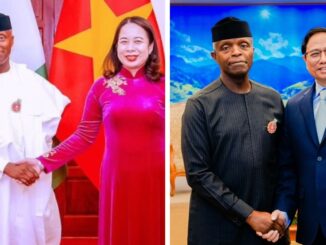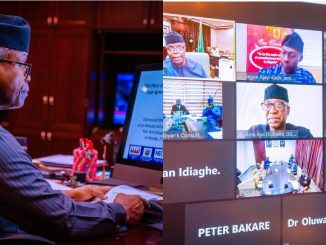
By Emmanuel Babafemi
June 28, 2024
The former House of Representatives aspirant on the platform of All Progressives Congress (APC) for AMAC/Bwari Federal Constituency, in Abuja, the FCT, Hamman, has said that women can gain more ground in politics if structural barriers are addressed.
The upwardly mobile women advocate in politics who is youngest aspirant for the House of Representatives in the 2022 elections, believes her constituents in the AMAC/Bwari Federal Constituency deserve better representation.
She said, “Women find it difficult to break into political positions because they are generally disadvantaged by gender ideology, cultural patterns, and predetermined social roles assigned to women and men as well as poor childcare, inadequate health care, and poverty.”
Hamman, the CEO of Sage Multi Media Concept, a platform that daily empowers youths and Nigerian citizens on politics and social affairs, encourages participation in politics said, “Though succeeding in politics is tough – succeeding as a woman is even harder,” still, women should be self-motivated and resilient in pursuing their goals and aspirations.
She averred that, “Millions of women around the world face discrimination, sexism and violence,” as there seems to be no exception for being a woman, but as an active and determined politician, Hamman believes women should gain more ground, especially in disadvantaged areas in Nigerian politics.
ALSO READ: Kenyan President Ruto refuses to sign contentious finance bill amid deadly protests
Hon Hamman who, thereby, commended President Bola Tinubu’s administration on his “Renewed Hope” agenda, stated, “I applaud President Tinubu’s commitment to the ‘Renewed Hope’ agenda of his administration, which I believe will significantly enhance the recognition and participation of women in politics.”
She, however, called for the further implementation of the 2006 National Gender Policy (NGP) in Nigeria, particularly advocating for the 35% Affirmative Action, which mandates that 35% of women should be involved in all governance processes, aiming to enhance female participation and representation across all levels of government.
“We need to urgently implement the 2006 National Gender Policy in Nigeria, particularly the 35% Affirmative Action, to ensure that women are actively involved in all governance processes. This policy is crucial for enhancing female participation and representation in decision-making roles across the country,” Hamman emphasises.
Reflecting on historical figures like Chief Margaret Ekpo, Hamman notes the impactful roles women have played despite challenges. She then outlines five strategies to enhance female participation in politics:
1. Setting quotas for female representation: “Implementing ambitious and well-designed quotas for the number of women politicians is one of the most critical success factors in augmenting women’s representation in politics. Therefore, clear, well-structured, and well-drafted regulations with effective enforcement mechanisms must be implemented.”
2. End violence against women in politics: “Physical, sexual, and psychological violence against women is among the most widespread human rights violations today. Online and offline hate speech, sexist comments, sexual harassment, and physical assault are also widespread and are regularly used as tactics to dominate and silence women in politics. These need to be tackled by establishing cross-party, mixed-gender working groups in politics across the globe to eliminate gender-based violence; develop standards and policies to combat sexism and harassment; and establish an independent, confidential, and fair complaints system that those working in politics can trust.”
3. Mentoring: “The fear of ‘big politics’ is real for many women around the world, and factors such as self-doubt, stereotypes, and personal reservations often prevent even the most politically gifted women from entering government. There should be tutorship programmes, including those developed by political parties that will help to connect women with more experienced female politicians and gain the necessary experience by learning from their insight. Women politicians – who are often newcomers – can also benefit from mentorship, by helping them become leaders and progress in their careers.”
4. Increase women’s participation in media: “The impact of the media on the status of women – including those serving as Ministers – has long been a concern, as gender-based stereotypes are perpetuated on television, on the Internet, and in print to this day. Women are still stereotypically disassociated from public life and politics, and the association of women with physical appearance, nurturing, and private life leads to media coverage focusing more on a woman politician’s personal background, clothing, marital status, and children – or lack thereof. Media personnel at all levels – from reporter to editor – should be aware that, while certain stories ‘sell,’ they do so at the expense of perpetuating gender patterns that run counter to efforts to strengthen democracy. Educating journalists, calling attention to bias, and creating projects that monitor press treatment of women politicians, politicians, and presidential candidates – and document sexist coverage – are all effective ways to increase women’s representation in the media.”
5. Expand participation through women’s caucuses: “Women’s politicians caucuses – pursued even in the most politically combative environments – allow women politicians to work collaboratively across party lines to foster gender equality legislation and policy agendas. They can help amplify women’s voices and influence in politics, where they are often in a numerical minority. However, due to a lack of support, resources, and sometimes power, women lack the feeling of empowerment and recognition needed to promote legal reform. It is therefore imperative that additional efforts, organizational support, and leadership are provided for caucuses to succeed.”
As she concluded, Hon Hamman emphasised the vital importance of these measures, stating, “Implementing these strategies is essential for creating a truly inclusive and equitable political landscape where women can thrive and lead.
“The future of our nation, Nigeria, depends on the active participation and representation of women in all facets of governance,” Hamman submitted.




